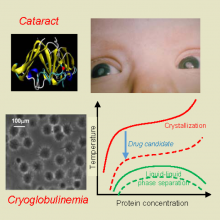My honors project began as a DIS in the summer of 2016. After working for Dr. Wang during the summer months I was able to find an area of research that I wanted to do an honors project on. Hesitantly titled Eye Lens Proteins and its Genetic Mutant, R58H, we have optimized the recombinant protein production of human eye lens protein and its cataratogenic mutant in bacteria (E. coli) culture. With the protein produced, we have begun initial screenings of compounds that might raise the solubiilty of the mutant protein in the hopes of reversing cataract formation.
I was interested in doing research with a professor and it was my advisor, Mrs. Kieber, who recommended I look at Dr. Wang's research areas. After a meeting with him, I enrolled in a DIS for a summer semester. I wanted to find a research area that could develop into an honors project.
The research experience has taught me more than I ever could hope to learn in a classroom. Not only that, the practical knowledge gained from working beside faculty and graduate students is invaluable. I'll use the word challenging lightly because I'm passionate about the research projects we are involved in, so I don't necessarily find it overwhelming by any means. One of the most important things I've learned from the project is how to communicate in collaboration studies. Everyone has an expertise and I've learned how important it is to draw on other professors' knowledge too.
There will always be a need for good research scientists and technicians. Working in a lab, you learn to interpret information and read between the lines. Rarely do you conduct an experiment without running into a few obstacles. I feel that finding unique solutions to problems and interpreting data in a meaningful way is an important trait as an employee and as an applicant to graduate school. In short, working in any lab at UNCW will give you real world skills that just aren't found in the classroom.





